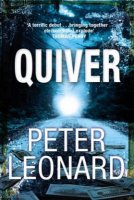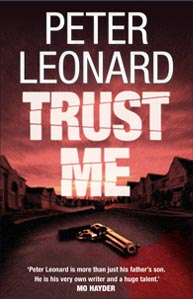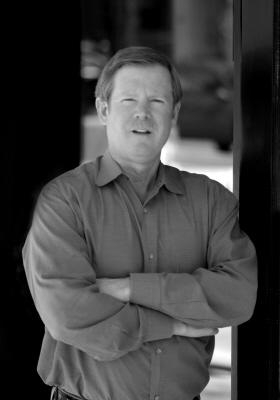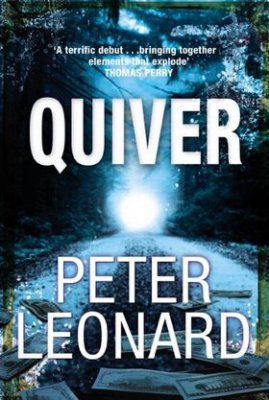|
Peter
Leonard’s debut novel Quiver
garnered great reaction among
crime fans and press alike. George
Pelecanos said, “Quiver’s
supercharged plot, rhythmic dialogue and cool-under-pressure characters
kept me
reading into the night. An impressive, exciting debut from Peter
Leonard.” Trust
George, believe me. I’ve
admired his father’s writing for a long
time and when I finished Quiver, I
had to agree with the rave reviews.
When
the opportunity came along to put some questions to him, I naturally
jumped at
the chance. You can read the opening
pages to Quiver.
Synopsis:
Kate McCall's
husband has been killed by her son,
Luke, in a tragic bow-hunting accident. In the aftermath, Jack, a
charismatic
but troubled ex-con from Kate's past, shows up. When Luke takes off on
his own
for their rural Michigan cabin, Kate and Jack follow, but they're not
the only
ones hot on his heels. Two-time losers Teddy and Celeste, along with
hit man
DeJuan, are all looking to cash in on the money left to Kate. As they
all head
for the woods of northern Michigan, events rapidly spiral towards a
dramatic
life-and-death confrontation.
By way of an introduction, could you tell
us a little of your background?

I’m
57, been married for 28 years. I have three sons: Tim, Alex and Max,
and a
daughter named Kate. I’ve lived in a suburb of Detroit
all my life except for a
couple years in Ann
Arbor,
a college town about an hour away, and
a year in Rome.
I’ve written three novels but I still
work in advertising. I’m a partner in an agency that calls on
VW and Audi. I
like to read and watch movies and cook and listen to music of all
kinds. I go
to sporting events and concerts. I play tennis and collect wine and
travel. I
typically visit a country or two in Europe
every year.
QUIVER started as a film script what
made you write in that format?
After
writing ads for 25 years the idea of writing a novel seemed too
daunting. I was
used to writing about products, describing their features and benefits
in 100
words or less. Writing a script seemed easier, and was, although it
wasn’t
particularly satisfying.
What made you decide that it would be better
as fiction?
My
father said why did you write a script? Writing a script is like
wanting to be
a co-pilot. If you want to write, write a novel. Elmore’s
criticism is probably
what motivated me to finally try writing fiction.
With a novel presumably you know where
you are going when you begin?
I did with QUIVER because I
had the script as
a blueprint. I didn’t with Trust Me, my second novel, and I
have to say, not
knowing is a lot more fun.
Were you trying to create a positive
heroine in Kate McCall out of an average woman in society?
Yes,
I liked the idea of thrusting a suburban mom into a life-threatening
situation
and seeing how she would react.
You gathered together a really colourful
set of characters: Celeste, Teddy, Jack and DeJuan. Is there a
particular one
that you favour and why?
I
liked DeJuan, his cool calm demeanour. I couldn’t wait to get
back to him. To
me he’s the most interesting character, and his scenes were
the easiest to
write. I don’t know what that says about me.
Why is it that crime writers always seem
to favour the bad guy?
Bad
guys are more interesting, more fun. Writers can have a good time
living
vicariously through them.
There is an old saying that there is
loyalty amongst thieves but not in the case of your characters, did you
purposefully set out to turn this on its head?
I
don’t believe there is loyalty among thieves when
there’s $2 million at stake.
There is a strong sense of rhythm in your
book, are you conscious of this?
I try to keep the reader
slightly off balance,
punching and counter punching.
Do you find your words come from images
and lines rather than from ideas?
I
picture scenes and hear characters talk.
Do you wince when people say they see a
resemblance between your style of writing and that of your
father’s?
The
comparisons are inevitable. I chose my father’s genre and I
tell my stories
through the eyes of my characters in shifting points of view. So there
are some
obvious similarities.
But I think there are a lot of differences too. Elmore Leonard would
never
write a story like QUIVER. It’s too sentimental.
Has having a famous father helped or
hindered you in any way?
I
think it has hurt more than it has helped. Finding an agent and a
publisher was
probably easier, but I’m clearly still in Elmore’s
shadow. I think it’s going
to take a while to shake him.
Are you conscious of writing within the
boundaries of the genre?
I
don’t know what the boundaries of the genre are. I picture
the story like a
movie and tell it the way I see it.
Would you consider yourself a crime
writer?
Not
really, but there are criminals and crimes in all the books
I’ve written, and
books have to be categorized.
Being an American writer are there any
advantages or disadvantages over other nationalities?
I
don’t
think so. There is good material for stories everywhere. I think if you
want to
write you write.
Who do you feel have been the people who
have influenced you?
Hemingway,
Steinbeck, John O’Hara, James M. Cain, John D. MacDonald,
Charles Willeford, Cormac
McCarthy, Philip Roth, and of course Elmore Leonard.
How do you work/ Can you describe how you
write your first draft?
I
write longhand on a yellow legal pad with a Pilot Precise V7 pen. I
usually sit
in a chair with my feet on an ottoman. I typically write a chapter this
way and
then transcribe it to an Apple Mac computer in my office, or an Apple
Macpro
laptop at my house. It takes me a year, part time, to write a 300-page
novel. I
take it a chapter at a time, editing as I go along. However, if I
can’t solve a
particular problem I may put it off and come back to it later. I write
when I
can, evenings, weekends and also during the workday if possible. But I
get
ideas all the time: when I’m driving home from work, when
I’m taking a shower,
when I’m cooking dinner. I write the ideas on a note pad and
use them later.
What do you find is the most difficult
aspect of writing?
Description.
Describing things, places and action.
What do you like most about your own
writing?
Getting
in the head of a character and writing the scene from his/her point of
view. I
also enjoy crafting dialogue. I’ll write a scene with two
characters talking
and add their gestures, descriptions and pauses later. Once the story
gets
going, it’s almost as if the characters take over. I
don’t know what they’re
going to do.
Is there anything unique about the
writer’s
eye?
Once
you start writing you notice more. You memorize details. You listen to dialogue
more carefully. If I hear a good line or anecdote I’ll look
for a place to use
it.
Who do you write for?
When
I write a book I have to please myself first. I have to think
it’s good or
nobody else will. I think of the reader when I’m plotting,
trying to create
suspense, leaving clues here and there that will mean something later
on.
I’ve often wondered if writers feel
encouraged by good reviews or discouraged by bad ones?
Imagine
spending a year writing a book and having it trashed by a critic in a
brief
review. I try not to dwell on bad reviews. Good reviews, not
surprisingly, are
gratifying. I’m writing to entertain a mass audience and good
reviews help sell
books.
Have crime and thrillers played a
significant part of your reading background?
Definitely.
I’ve read and been influenced by countless crime novelists
and novels, starting
with The Postman Always Rings Twice
by James M. Cain.
Can you tell us what you are working on
now?
I’m
just finishing a suspense thriller set in Rome,
Italy.
It opens with two American
students stealing a taxi (based on a true story), getting arrested and
sent to
Rebibbia Prison where they cross paths with members of a Mafia gang.
Finally, I’ve probably skipped many
things you would prefer talking about, so is there anything particular I left out?
I
think QUIVER’S main appeal is that it’s a quick
read and it’s entertaining. I’ve
always felt that reading a good book is the purest form of
entertainment. It’s
you and the book. You’re involved in the story. You try to
figure out what’s
going to happen. You get to know the characters and picture them your
own way.
I try to hook the reader quickly and keep the pages turning.
I’ve had a number
of people tell me they were up half the night trying to finish QUIVER,
and for
me that’s highest form of praise.

QUIVER,
published by Faber &
Faber pbk March 2009 £6.99
TRUST ME
published by Faber &
Faber Hbk March 2009 £18.99
|








